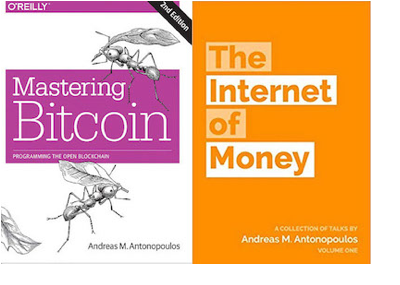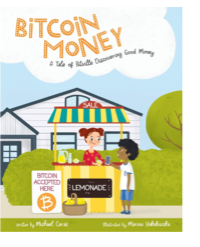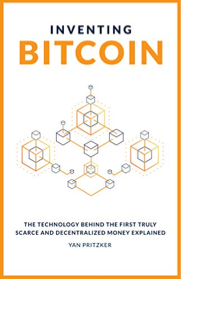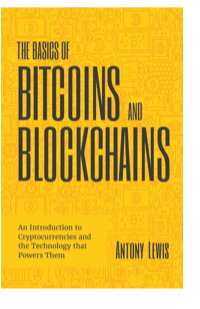Lots of emerging technology spins through the hype cycle, ricocheting from buzz to backlash to fatigue to, maybe, real-world application. Blockchain is certainly no exception.
Even now, a decade after its arrival and long after gaining some adoption in the corporate world, blockchain remains dogged by cautionary tales of course correction. And it can still seem opaque to outsiders, including those who share the persistent misconception that the technology is always synonymous with crypto.
Nonetheless, blockchain’s genuine use value has led to steady adoption in a disparate array of industries, including media (where it aids trademarking), healthcare (where it keeps patient records secure) and, of course, finance. All of which means that while ignoring the hype and clearing the high technical bar may seem challenging, doing so is a must.
14 Recommended Blockchain Books
- “Mastering Bitcoin” by Andreas Antonopoulos
- “The Internet of Money, Volumes 1 - 3” by Andreas Antonopoulos
- “The Bitcoin Standard” by Saifedean Ammous
- “Blockchain Revolution” by Don and Alex Tapscott
- “The Truth Machine” by Paul Vigna and Michael J. Casey
- “Bitcoin Money” by Michael Caras and Marina Yakubivska
- “Inventing Bitcoin” by Yan Pritzker
- “The Starfish and the Spider” by Ori Brafman and Rod A. Beckstrom
- “The Three-Body Problem” by Liu Cixin
- “The Basics of Bitcoins and Blockchains” by Antony Lewis
- “The Blockchain Developer” by Elad Elrom
- “Satoshi's Vision: The Art of Bitcoin” by Craig Wright
- “Complex Social Networks” by Fernando Vega-Redondo
- “The Handicap Principle” by Amotz and Avishag Zahavi
Books on blockchain can help beginners get up to speed with overviews of the technology’s most need-to-know elements, provide deeper dives for those interested in more niche subtopics, including programming and development, and give a glimpse into why there’s been such a frenzy around bitcoin.
But it’s not all about definitions and complex discourse. Among some of the best books on blockchain are works of fiction that make grasping the theoretical side more approachable and digestible. Taking into account your prior knowledge about blockchain and cryptocurrencies and choosing the right book — such as one with a strong visual component if that’s how you learn best — can make all the difference.
Built In asked four blockchain experts to recommend books about the technology in general or aspects of it. We spoke with:
- Hannah Rosenberg, managing director of Blockchain Institute Chicago and founder of blockchain/crypto consulting and training firm Velas Commerce. She also organizes the BOB Chicago meetup and co-teaches a blockchain course at UIC’s business and finance department
- Joe Hernandez (aka “Disruption Joe”), founder of Voice of Blockchain and Chicago Blockchain Project. He’s also an independent consultant who gives blockchain and crypto talks
- Charles Stack, CEO and co-founder of startup accelerator Flashstarts and a committee member of Blockland, a Cleveland, Ohio-based blockchain initiative
- Brendan Lee, head of technology at Singapore-based Bitcoin consultancy Faiā, and training and development manager of Bitcoin Association
From blockchain-meets-macroeconomics texts to explorations of key concepts like decentralization and asset distribution, here are their picks.
Blockchain Books Recommended by Hannah Rosenberg
 Mastering Bitcoin: Programming the Open Blockchain (Second Edition)
Mastering Bitcoin: Programming the Open Blockchain (Second Edition)
The Internet of Money, Volumes 1 - 3 by Andreas Antonopoulos
I’ve written two courses on Bitcoin, specifically for developers or just a technical overview of Bitcoin. And so I did a lot of reading on that. My favorite technical, practical-application book on Bitcoin is “Mastering Bitcoin” by Andreas Antonopoulos. That book is just stacked. It’s sitting on my desk right now. It’s been there since it came out a couple of years ago, and I’ve relied on it heavily.
If I’m trying to just get someone to grasp why blockchain technology is important, then I’m probably going to send them back to one of Andreas Antonopoulos’s three “Internet of Money” books. They’re essentially transcripts of his talks. Andreas has a fantastic technical understanding of Bitcoin. He also does a really good job of communicating the importance of the technology in a very easily absorbable way.
 The Bitcoin Standard: The Decentralized Alternative to Central Banking by Saifedean Ammous
The Bitcoin Standard: The Decentralized Alternative to Central Banking by Saifedean Ammous
I really like the first half of “The Bitcoin Standard” because it does a good job of explaining some of the monetary theory behind Bitcoin — so the difference between what he calls hard money and easy money, or deflationary and inflationary money.
It also does a very good job of describing how different types of money, along with our own financial behavior, impact the economy: Does it encourage spending or does it encourage savings and investments? So I like that explanation, which is mostly in the first half. The second half of the book takes it too far. Saifedean — who did a book talk for my meetup — is a very smart guy, but I kind of blame him for causing some of these ridiculous hashtags that go around in the Bitcoin world — like #BitcoinFixesEverything.
 Blockchain Revolution: How the Technology Behind Bitcoin and Other Cryptocurrencies Is Changing the World by Don and Alex Tapscott
Blockchain Revolution: How the Technology Behind Bitcoin and Other Cryptocurrencies Is Changing the World by Don and Alex Tapscott
The Truth Machine: The Blockchain and the Future of Everything by Paul Vigna and Michael J. Casey
“The Truth Machine” is pretty good, even if it gets a little bit too excited. I’m such a Bitcoin cheerleader and have been in love with this tech for seven years now, so when I see something even I can’t stomach, you’ve just gone way too far. “The Truth Machine” does that a little bit.
You’re not helping Bitcoin when you deny it has problems. We need to address and work on them, not just ignore them. If I remember correctly, there’s a chapter called the “God protocol.” I was like, You just lost me there. But the book still does a pretty good job of explaining blockchain’s potential.
“Blockchain Revolution,” on the other hand, has a whole section about the problems with blockchain tech. So, yes, it covers all the amazing, fantastic things it’s going to do, and the revolution it’s going to bring in. And then it says, Okay, but there are problems. This tech isn’t perfect, it’s not magic. Here are the specific issues.
 Bitcoin Money: A Tale of Bitville Discovering Good Money by Michael Caras (Author) and Marina Yakubivska (Illustrator)
Bitcoin Money: A Tale of Bitville Discovering Good Money by Michael Caras (Author) and Marina Yakubivska (Illustrator)
“Bitcoin Money” is a kids’ book that explains the basics of monetary theory, like inflation. I brought it home and gave it to my daughter, who loves to read. She read the whole thing, and then asked me all kinds of questions. And then I was walking her to school one day, and she started talking about inflation! I thought, Awesome! “Bitcoin Money” made my daughter sound like a monetary theory expert, so I’ll give it two thumbs up for that. And most of us are pretty visual when it comes to learning; we still like narratives and pictures.
Blockchain Books Recommended by Joe Hernandez
 Inventing Bitcoin: The Technology Behind The First Truly Scarce and Decentralized Money Explained by Yan Pritzker
Inventing Bitcoin: The Technology Behind The First Truly Scarce and Decentralized Money Explained by Yan Pritzker
Written by the former CTO of Reverb.com, “Inventing Bitcoin” will help you understand Bitcoin — and people need to understand Bitcoin in order to understand blockchain. Often, when enterprises put blockchain into their systems, it’s actually just a data structure of blocking transactions together and then having a consensus that everything in that box, before you pack it away, is what you say it is. Then you fill the next box, block again [and continue the cycle].
That technology has been around since the ‘70s and widely used since the early ‘90s. It’s not particularly new; there was just a new focus on it when people started talking about blockchain. Bitcoin did something different: it found a mechanism that actually aligns a self-organizing system. What I mean by that is, there’s an asset or a unit of account that keeps track of people’s input into this collective public infrastructure.
 The Starfish and the Spider: The Unstoppable Power of Leaderless Organizations by Ori Brafman and Rod A. Beckstrom
The Starfish and the Spider: The Unstoppable Power of Leaderless Organizations by Ori Brafman and Rod A. Beckstrom
The fundamental concept of “The Starfish and the Spider” is that if you cut off a spider’s head, it dies, but if you cut off a starfish’s leg, it grows a new one. That leg grows into an entirely new starfish. So traditional top-down organizations are like spiders, but starfish organizations are changing the face of business. That’s what Bitcoin and Ethereum are.
It’s a business book about leaderless organizations, [focusing on the] decentralization aspect, which is what most people don’t fully understand. This one’s kind of a cult favorite within the blockchain community, written the year before Bitcoin came out. There’s an unstoppable power to leaderless organizations, because when you cut off the arm, the arm can grow a whole new body.
 The Three-Body Problem by Liu Cixin
The Three-Body Problem by Liu Cixin
“The Three-Body Problem” is another one that people in the blockchain space definitely know. It’s important to understand the divide between people who understand the disruptive part of blockchain — which is game theory meets cryptography meets open source software — versus the non-disruptive, but still innovative for business, aspect, which is a new approach to cryptography security that was created by Bitcoin. That’s cool. It’s innovative. But the disruptive side is encapsulated by the multiplayer game theory, which is what the show Billions is about. But this is one of the best fiction versions of it.
In the book, there’s a game in which participants have to understand the patterns of the planet they’re on. And if they look at it like it’s earth with one moon, it makes a lot of sense that the seasons last a certain time. But then that pattern is thrown off by a black swan event. And they realize there’s actually a second moon, which they think is the first moon. But every once in a while they come close enough together that it creates a super long winter, and everybody dies off in the game and they’re trying to figure out what this phenomenon is, while never being able to see it. And it explains the black swan events. But also it explains, [in a simplified fashion], the math of understanding multiplayer game theory
Most people aren’t going to truly understand game theory right away, but if you’re given a visual, you can understand things easily. This book explains it in a very visual way that makes the multivariate game theory aspects more digestible.
Blockchain Books Recommended by Charles Stack
 The Basics of Bitcoins and Blockchains: An Introduction to Cryptocurrencies and the Technology that Powers Them by Antony Lewis
The Basics of Bitcoins and Blockchains: An Introduction to Cryptocurrencies and the Technology that Powers Them by Antony Lewis
“The Basics of Bitcoins and Blockchains” covers a lot of ground and is fairly comprehensive. I think it’s the best introductory book available. It’s the best overview — without being over the top.
The firm I co-founded, Flashstarts, is moving to corporate consulting, and this was the book I picked to recommend to our clients. I think any manager in a corporation should have enough understanding of a new technology so that it doesn’t seem like magic.
 The Internet of Money by Andreas Antonopoulos
The Internet of Money by Andreas Antonopoulos
“The Internet of Money” is one that I just adore, and probably the first Bitcoin book I read. It’s wildly enthusiastic — Bitcoin will save the universe — but he’s not wrong half the time. He’s a great speaker, a great writer. If you want to understand why people are excited about Bitcoin and blockchain, this is the book to go to.
Most of the Bitcoin maximalists, like Andreas, are focused on the fact that there will only ever be 21 million Bitcoins, so therefore the price has to go up. And that’s a little bit disingenuous, because government regulation could impact that rather negatively if it ever comes to pass.
 The Blockchain Developer by Elad Elrom
The Blockchain Developer by Elad Elrom
There hadn’t been a good blockchain technical book, I don’t think, until “The Blockchain Developer” arrived. I know there are some that many people in the community like, but this one, published by Apress, is the best application book for developers.
Blockchain Books Recommended by Brendan Lee
 Satoshi's Vision: The Art of Bitcoin by Craig Wright
Satoshi's Vision: The Art of Bitcoin by Craig Wright
“Satoshi’s Vision” is a compilation of writings from Craig Wright over the last several years covering all aspects of Bitcoin, including in-depth technical points, legal and moral quandaries and more. I believe without a doubt that Craig was Satoshi [Nakamoto] and created Bitcoin.
 Complex Social Networks by Fernando Vega-Redondo
Complex Social Networks by Fernando Vega-Redondo
“Complex Social Networks” explores the theory of complex social networks. With the creation of the world wide web, we have become a connected species, and I don’t believe there is a technology that can accelerate the advent of human hyper-connectivity faster, or more safely than Bitcoin. The book covers basic forms of networks that develop in social contexts, including (importantly) the small world network that we already see forming in Bitcoin. Understanding how networks form is important knowledge when designing a project and is a key point when deciding how to engineer a product. This book helped me to understand that there are multiple social networks at play in Bitcoin, and that they operate in fundamentally different ways.
 The Handicap Principle: A Missing Piece of Darwin's Puzzle by Amotz and Avishag Zahavi
The Handicap Principle: A Missing Piece of Darwin's Puzzle by Amotz and Avishag Zahavi
“The Handicap Principle” explores the concept of costly signals in nature, which had been heretofore misunderstood by evolutionary scientists. Costly signals such as a heavy tail and vibrant plumage serve a purpose beyond adding to an animal’s fitness, by demonstrating that even with the handicap of carrying a heavy weight of feathers, or being highly visible to predators that the animal has maintained its fitness over and above the others in its species. The handicap principle is ever present in Bitcoin, with one of the most prescient examples being the migration of the Bitcoin Ledger from the BTC network to the BCH network, and then again to the BSV network. Miners incurred significant cost to undertake this action yet it has served to demonstrate that Bitcoin is a robust protocol distinctly separate from a ticker symbol or codebase. Costly signals are everywhere in human society and being able to see them and understand them for what they are is a key skill for people wanting to predict the next steps that technology and markets will take.
Interviews edited for length and clarity.




